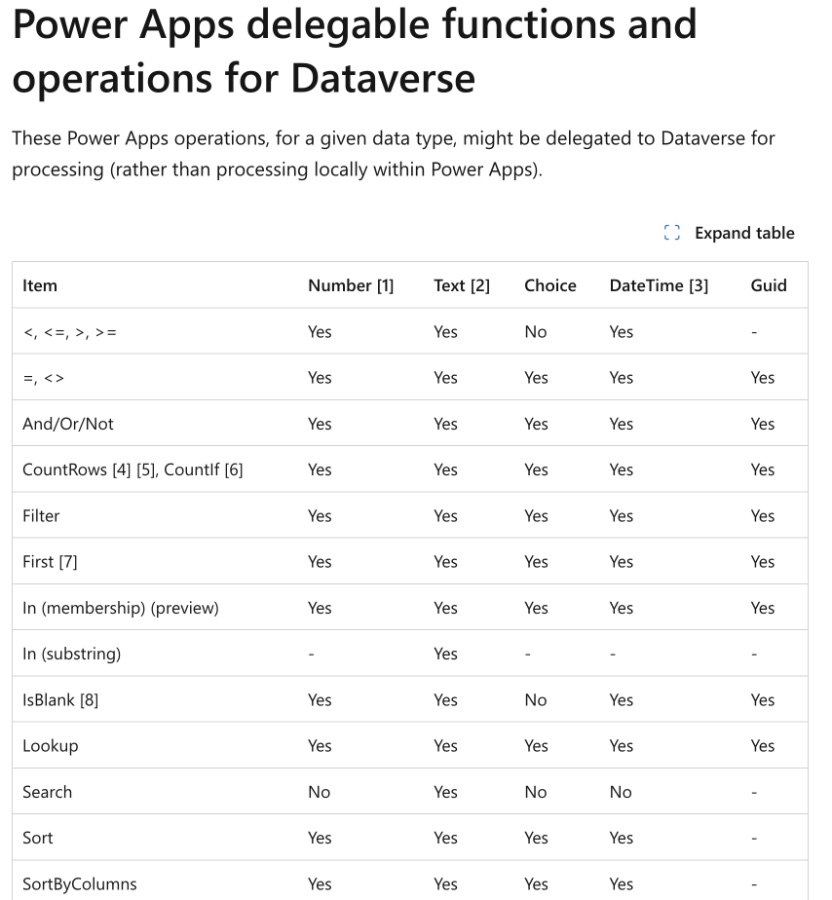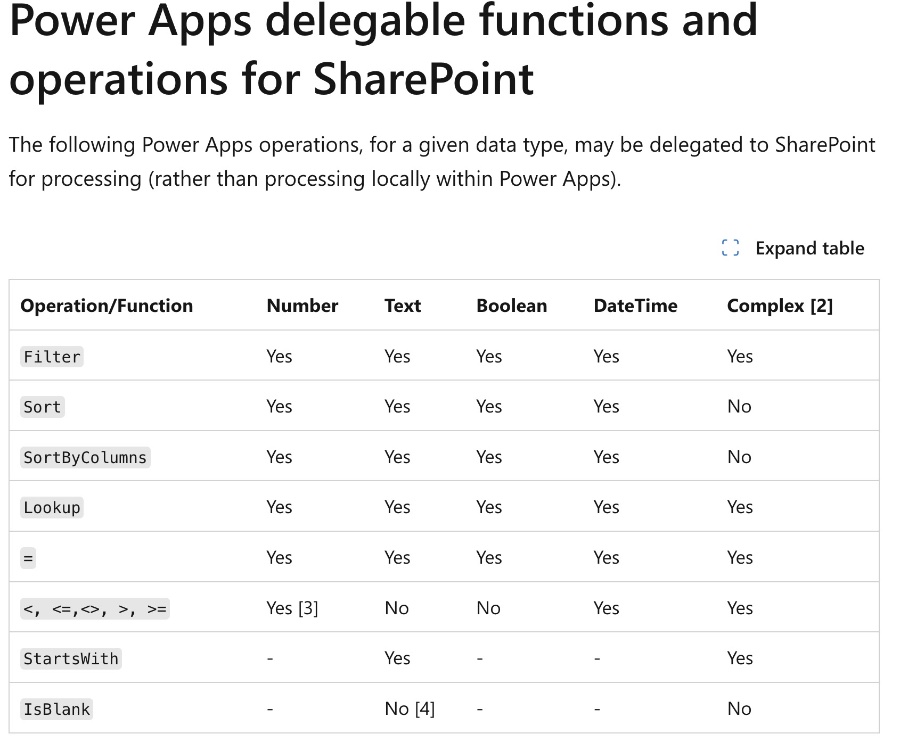- All of Microsoft

Why Switching from Sharepoint to Dataverse Makes Sense
Switch from SharePoint to Dataverse: Unlock Efficiency for Business Apps
Key insights
5 Key Insights on Migrating from SharePoint to Dataverse for Business Apps
- Comprehensive Understanding Required: If you're a Citizen Developer, Office Developer, or Tech Leader, understanding the scope and framework of Dataverse is essential for effective application development.
- Scalability and Efficiency: Utilizing delegable functions and operations in Dataverse enhances the scalability and efficiency of Power Apps, enabling them to handle large datasets effectively.
- Delegable Operations: Operations such as filtering, sorting, column operations, aggregation, and basic logical comparisons are delegable in Dataverse, facilitating optimized data processing.
- Limitations of Non-Delegable Operations: Some functions and operations are non-delegable, and their use can significantly impact the performance of apps when dealing with extensive datasets.
- Maximization and Optimization: Best practices include maximizing the use of delegable functions, understanding and respecting the delegation limits, optimizing data sources, and continuously testing the app performance.
The Power of Delegable Functions in Dataverse
Exploring the Efficacy of Microsoft Dataverse for Businesses
Microsoft Dataverse stands tall as a pivotal component in the revolution of app development within the enterprise landscape. As businesses continually seek platforms that provide seamless, reliable, and scalable data integration, Dataverse emerges as a beacon for developers and tech leaders alike. The allure of Dataverse, particularly for those transitioning from SharePoint for model-driven application development, lies in its robust capacity to manage vast datasets efficiently, courtesy of its delegable operations. This dynamic platform fosters an environment where apps are not just developed but equipped to evolve alongside the ever-growing data needs of businesses.
The critical element in harnessing the full power of Dataverse lies in the understanding and application of delegable functions such as filtering, sorting, and aggregating data. The architecture of Dataverse is designed to optimize application performance, enabling developers to build applications that not only meet current data demands but are also future-proof. However, developers must be mindful of the limitations posed by non-delegable operations that can hinder app scalability and performance.
As businesses navigate the digital transformation journey, the adoption of Dataverse offers an enticing promise of efficiency, scalability, and superior data management. By adhering to the outlined best practices, developers can leverage Dataverse to craft applications that transcend traditional data handling limitations, propelling their enterprises toward achieving operational excellence and a competitive edge in today's data-driven world.
Delegable Functions and Operations for Dataverse:
Delegation supports a variety of functions and operations:
- Filtering and Sorting: Allows you to filter rows and sort data in both ascending and descending order.
- Column Operations: Finds the first record that meets a specified condition and filters records based on a search string in a text column.
- Aggregation: Delegable aggregation functions allow for operations on large datasets.
- Logical and Comparison Operations: Basic operations are delegable, facilitating efficient data processing.
Non-Delegable Operations:
Some operations are non-delegable, affecting performance with large datasets. These include complex operations, certain string manipulations, and advanced calculations.
Best Practices:
To build efficient and scalable apps, maximize the use of delegable functions, understand delegation limits, optimize data sources, and test performance regularly.


This video by Bulb Digital highlights the importance of considering Microsoft Dataverse for building model-driven apps, moving away from traditional SharePoint lists and libraries due to their limitations. A key part of the video focuses on the reasons to choose Dataverse as a data repository for business applications. These reasons range from the ability to change everything in your app development process to detailed permissions management, along with insights on licensing costs and application lifecycle management.
The video starts by asking if the viewer is a Citizen Developer, Office Developer, or Tech Leader, suggesting that the content is relevant for a wide audience within the tech industry. The reasons presented for considering Dataverse include its comprehensive application lifecycle management and the improved delegation limits it offers, which are critical for efficient app performance. Additionally, the video touches on the personal stories and encouragements from the author, aiming to inspire viewers to explore Dataverse for their business needs.
Power Apps' interaction with data from various sources, including Microsoft Dataverse, provides a powerful platform for custom application development. Understanding how to maximize the use of delegable functions and operations within Power Apps when working with Dataverse is crucial. The video elaborates on these functions and operations, including filtering, sorting, column operations, and aggregation, emphasizing the importance of delegation for efficiency and scalability in apps handling large datasets.
However, the discussion also acknowledges that there are limitations with non-delegable operations, which can affect app performance when dealing with large amounts of data. These limitations highlight the need for app developers to structure their Dataverse tables and columns to fully leverage delegation. Moreover, the video advises on best practices such as maximizing the use of delegable functions, understanding delegation limits, optimizing data sources, and regularly testing app performance with realistic data volumes.
Through these discussions, Bulb Digital's video delivers a comprehensive overview of why developers should consider transitioning from SharePoint to Dataverse for building model-driven apps. It underscores the pivotal role of delegation in achieving efficient and scalable app performance, making a compelling case for Dataverse's capabilities in handling complex business applications.
Exploring Microsoft Dataverse in Depth
Microsoft Dataverse offers a cloud-based solution for data storage and management, proving to be an invaluable asset for businesses aiming to develop applications that are efficient, scalable, and easily integrated with other services. Its rich set of features supports complex data types, relationships, and validation rules, making it easier for developers to create sophisticated applications without needing to manage the underlying data storage architecture.
With Dataverse, businesses can break down data silos, promoting better data accessibility across the organization through its seamless integration with the Power Platform and other Microsoft services. This integration fosters streamlined workflows and enhances productivity by enabling users to innovate with the data directly within their business apps.
Another significant advantage of Dataverse is its security model, which provides detailed control over data access through a granular permissions system. This ensures that sensitive business data is protected, and only authorized users can access or modify it, meeting a critical requirement for business applications in various industries.
Moreover, the platform's global availability ensures that businesses can rely on Microsoft's cloud infrastructure for high availability and disaster recovery capabilities. This global presence matches the needs of multinational corporations looking for a consistent and reliable data management solution across their operations.
In summary, Microsoft Dataverse stands as a robust platform supporting the creation and management of data for business applications. Its emphasis on efficiency, scalability, and security, integrated within the broader Microsoft ecosystem, makes it a compelling choice for businesses looking to leverage their data in innovative ways.
This is your sign to drop SharePoint for Microsoft Dataverse. Building Model Driven Apps that leverage SharePoint lists and libraries have limitations. Here are 5 key considerations when weighing Microsoft Dataverse as a data repository for your business apps.
Are you a Citizen Developer, Office Developer, or Tech Leader? The discussion includes reason one - Changes Everything, Reason Two - Questions to Ask, and details on Microsoft Dataverse Licensing Costs. The conversation also covers Delegation Limits, Application Lifecycle Management, Code Reviews, App QA team, Planned Outages, Detailed Permissions, and insights into The Workplace alongside Encouragements and Personal Story.
Power Apps provides a robust platform for creating custom applications that interact with data from various sources, including the Dataverse. Understanding delegable functions and operations is crucial for creating efficient apps that can scale. Delegation in Power Apps allows offloading data queries to the data source, enabling apps to work with large datasets efficiently.
People also ask
Can you use Dataverse with SharePoint?
To integrate SharePoint's document management capabilities with Dataverse, the following steps are necessary: Activate document management features in your Dataverse environment. Configure SharePoint integration via the Power Platform admin center. Turn on document management for the specific tables you're working with.
Why use Dataverse instead of SharePoint?
Dataverse offers fewer restrictions compared to SharePoint. It's crucial to remember that SharePoint allows referencing of items and documents through URLs. Consequently, if someone obtains the URL for an item, there's a high chance they could also access the information stored in other list items.
Keywords
Sharepoint to Dataverse migration, Dataverse benefits, Sharepoint alternatives, Migrate from Sharepoint, Why use Dataverse, Dataverse vs Sharepoint, Dataverse advantages, Switching to Dataverse